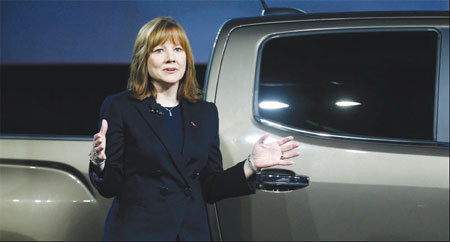Will GM moves affect China market?
|
Mary Barra, incoming CEO of General Motors Co, reveals the 2015 GMC Canyon pickup truck in an industrial building in advance of the media preview of the North American International Auto Show in Detroit, Michigan on Jan 12. Photo by Reuters |
Two top executive changes at General Motors Co last month give little reason to believe the moves will have any impact on the automaker's business in the US or China, according to analysts.
Matthew Stover, a Boston-based automotive analyst with Guggenheim Partners LLC, a global financial-services firm, said the move to usher in the new executive team "sooner rather than later" is a sign of "constructive growth."
"We now know who the team is but there are a lot of unknowns," Stover said Tuesday in an interview with China Daily. "In many ways they've been kind of hustled along in their development, so if everybody had their druthers maybe the team would be given a bit more time to develop."
GM's new executives, President Dan Ammann and CEO Mary Barra, assumed their positions on Jan 14 and Jan 15 respectively. Just more than a week later GM announced that Tim Lee, its China chairman, would retire in April after nearly 45 years with the company.
David Whiston, a senior equity analyst with Chicago-based investment research firm Morningstar Inc, said he does not see the GM personnel moves affecting much of the company's day-to-day business.
"With moves like Tim Lee leaving, there's always a chance that the new people don't get along with the other partners, but I'm not worried about these moves derailing business in China," Whiston said in an interview with China Daily. "China has been one of GM's best markets for a while now, and in 2013 they went over 3 million units for the first time."
Stover, the analyst with Guggenheim, said he does not expect "outstanding changes" in GM's relationship with China as a result of the management changes.
"China is an extremely important business region for GM," Stover told China Daily. "They have a strong relationship with the SAIC (the SAIC Motor Corp), which has been so incredibly fruitful for GM. From GM's standpoint, this operation is very much integrated into the global framework."
"I think there's always a rush to lionize and deify someone, but Mary is an unknown quantity on a number of fronts," Stover added. "She deserves a level scale in terms of how we appraise her performance."
Now GM's challenge is to grow to the point where they have enough "to take on the German manufacturers there," Whiston said. "That's obviously a long-term project for GM, but this is a brand that's really well known to the Chinese."
Due to Chinese government regulations, foreign manufacturers producing vehicles in China must do so as a joint venture with a Chinese company. However, only a limited number of partnerships are permitted.
GM has par th SAIC - formerly known as the Shanghai Automotive Industry Corp - to become one of the leading foreign car companies in China.
Recent data from GM shows that the US carmaker and its joint venture partners sold a record-breaking 3.1 million vehicles in China last year.
Though US retail sales for GM in January were down 10 percent year over year, the company remains upbeat about its business prospects going forward.
"We continue to perform well in the two most important markets in the world, the US and China," GM CEO Barra said in a press release in Jan. "We're taking advantage of our strength in these countries to restructure and make the investments necessary to grow profitably in other parts of the world."
GM will host a conference call to report earnings figures from the fourth quarter of 2013 on Feb 6.



















